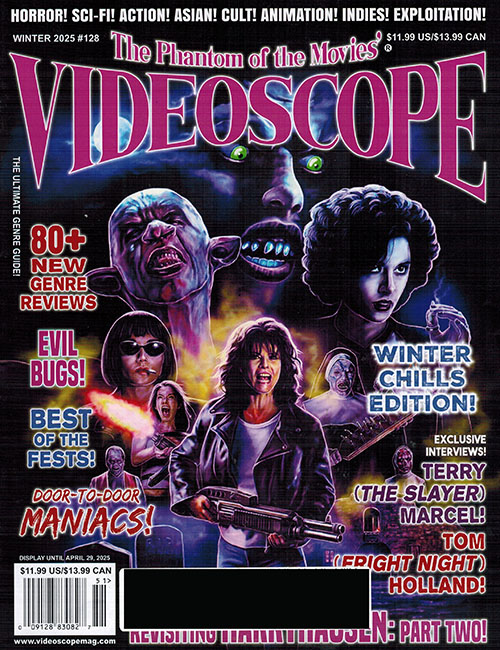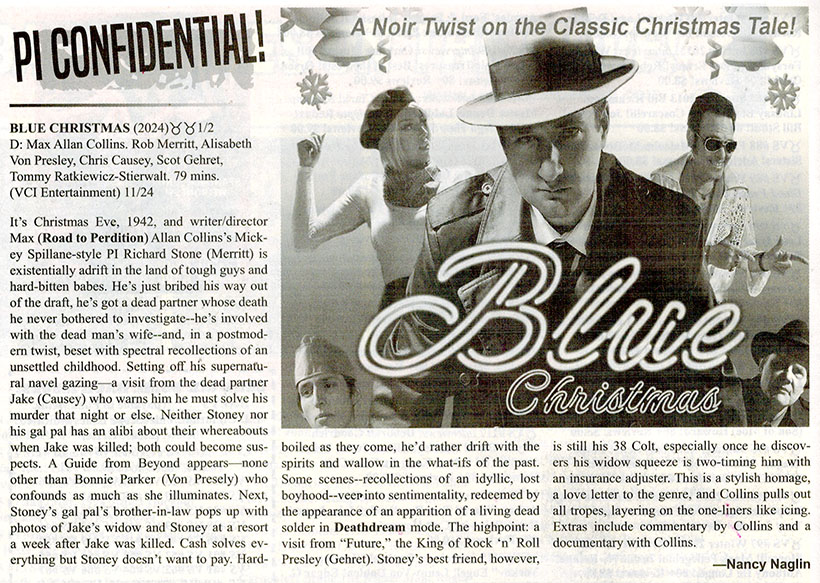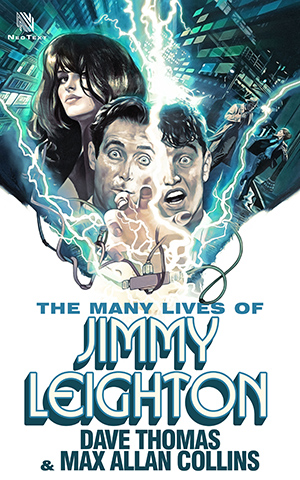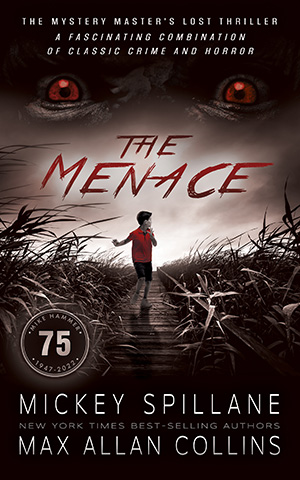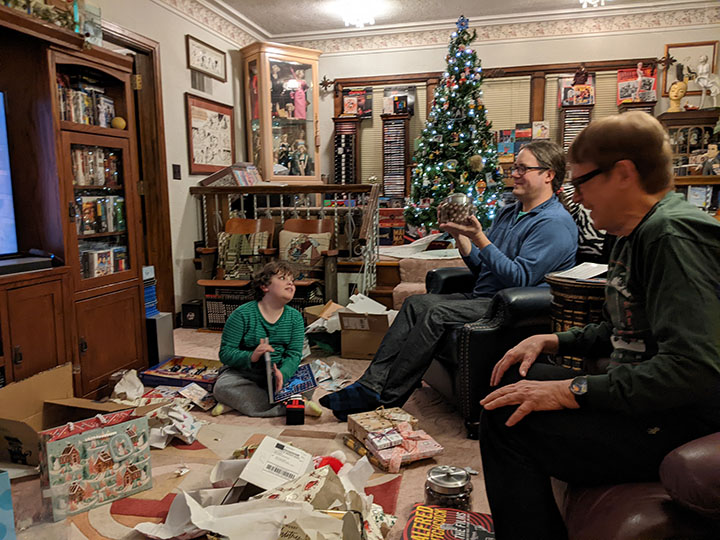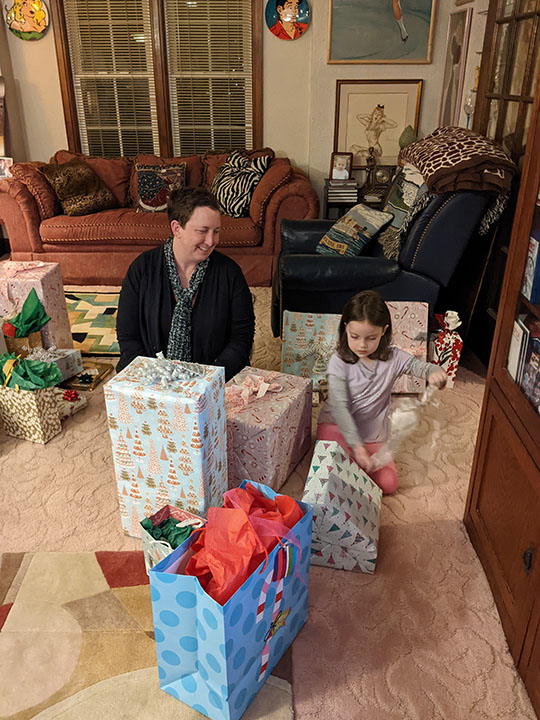All ten episodes of True Noir: The Assassination of Mayor Cermak should be available by a week from now (if not sooner) in various formats, including 5.1 stereo.

Director Robert Meyer Burnett has done a masterful job directing an incredible cast; he was also the editor and supervised the elaborate mix of sound effects and music.
A Blu-ray of the production will follow, including all ten episodes of my “History Behind the Mystery,” in which I talk about the real history behind each episode and a lot more. There’s also a lengthy interview Rob did with me before the production began (I had literally finished the Blue Christmas shoot the night before!). It will include a version of the entire production assembled into one “listen.”
This is no standard audio production. The budget was half a million dollars. If you support it, a second one will go into production and we’ll be on our way to a Nate Heller movie and possibly TV series. With the talented group that has come together for this unique production, great things are in the offing.
I’m going to discuss something that requires me to be a little circumspect – not generally my best quality. It has to do with a movie script (not written by me) for a production relating to one of my properties.
Despite the fact that I have written and directed seven features, written three more produced features (I’m in the WGA), and scripted an episode of the Quarry TV series on Cinemax, a show based on my own book series), I have rarely been invited to a have a crack at the script by the Hollywood folks who have optioned/bought my material. The reasons for this are many and varied. For one thing, most of my self-produced movies have been indies, some with micro-budgets.
Real Time: Siege at Lucas Street Market, Eliot Ness: an Untouchable Life and Blue Christmas were each at around a $10,000 budget with a lot of professional talent volunteering their participation in let’s-put-on-a-show fashion. In a world where twenty million is considered a low-budget, this makes the reluctance to use me on the screenplay at least understandable. My suggestion, for example, that I’d like to have a pass at Road to Perdition myself was met with shocked (and perhaps amused) surprise. That was the most naive thing the producers had ever heard.
Though few filmgoers even know the name of a screenwriter, much less have a favorite one, a big-time feature is essentially required to have a screenwriter who’s already had at least one major production made. (How those writers got their first assignment is a mystery none of my detective characters could solve.) This comes in part from the need to have a list of talent in all major slots (including screenwriter) that look good in a package. Money has to be raised. Studio execs need convincing. I get that. What I don’t get is why “We can get the person who created Road to Perdition to write the movie version” was such a laughable proposition.
It’s true that a good novelist, even somebody who’s written a critically acclaimed bestseller, isn’t necessarily an accomplished screenwriter. In fact some novelists downright stink at scripting. This largely comes from the two different skill sets of a novelist and screenwriter. Novelists write the interior of a story and screenwriters the exterior. So it’s not entirely a mystery why a producer might avoid using the source creator to write the script.
In my case, however, I have a track record of screenwriting that includes primetime movies on HBO and Lifetime, and a Cinemax series. My little regional movies have all won awards and their share of good reviews (and some bad ones – that comes with it).
This is not to say, “Boo hoo.” You can’t have a fifty-plus year writing career and come away thinking life is fair, even if you’re Stephen King. I often say to Barb, when I’ve written a book or had one optioned for the movies or television, “Well, I’ve got another ticket in the lottery.” Luck does seem to play as major a role as hard work and talent. I get that.
Why is this on my mind?
Well, I recently sat down with a script based on one of my properties, a script written by a guy who probably got half a million bucks at least to do so (my option was barely five figures). And I’m told the producers really like the script. As a courtesy more than anything, I was shown the script and encouraged to offer my notes.
The script had merit. But it also had a lot wrong with it. It did all kinds of things that even a smalltime screenwriter like me would know are wrong. Beginner shit. For example, using two lines of dialogue when one carries it. For example, following the action climax with fifteen minutes of tying up loose ends in dialogue. That kind of thing. What strikes me as remedial stuff.
After nineteen pages of handwritten notes, I typed them up as thirteen double-spaced pages. And then I had to sit and think about it. As a practical matter, since I make a big payday if the movie gets made, I should not bother. Let Hollywood be Hollywood. In a very real way, the last person they want to hear from is the source writer. I am trying to help, trying to make sure my property has been turned into a script that is not only relatively faithful to my work, but has a shot at pleasing audiences and being a success. But the result of my well-intended criticism might be (a) that I am viewed as just a troublemaker, or (b) (and this is worse) that the producers will realize the script needs work and the project slides into Development Hell.
Understand something: I could fix this script in a day. Maybe an afternoon. But I have as much chance of being granted that opportunity as I would to become the lead actor in the picture. And the smart thing to do would be not to send in my notes, but just say to them, “Wow, what a terrific script.”
This kind of frustration, this kind of reality, has accompanied me throughout my long career…and probably through most of the careers of the vast majority of your favorite fiction writers. It is why, despite a love for movies and moviemaking at least equal to my love for reading and writing books, I did not go West, Young Man (well I was young once). I chose books over movies because I could get a book written and published, and getting a movie made is really, really tough. Tough to get producers to give you a shot, tough to get a story told the way you want it. Tough not to get your heart broken.
After my run writing the Dick Tracy comic strip came to an end after fifteen fortunate years, I allowed myself to get pulled into indie moviemaking. And I loved it. About a dozen years of my career were devoted to that, and after a twenty-plus year break, I’ve returned to it in my waning days just to have the experience again – to bask in the collaborative nature of filmmaking. As a writer, I’ve often sought out collaborators – great people like Terry Beatty, Matthew Clemens, Dave Thomas and of course Barbara Collins – because synergy only happens when more than one factor comes into play. Fiction writing is a lonely trade whereas movie-making is lively affair, in my fortunate case always involving some pretty wonderful artisans.
I have no regrets being mostly a writer of books, short stories and comics. And no regrets, either, despite some bumps, about writing and sometimes directing movies in the world of indies.
But when I read something based on my work that I was not chosen to adapt myself, something that seems sub-par, I am nonetheless frustrated.
Recently I did a slight revision on my afterword to the forthcoming Return of the Maltese Falcon. Where normally an advance look at the first chapter might have been used as a promotional teaser, something had to substitute, because the public-domain nature of the original novel won’t kick in until my sequel is published next year. So advance promo couldn’t use any of my novel itself – we’d be in violation of the original copyright.
My editor at Hard Case Crime, Charles Ardai, is something of a wonder. Normally when you turn a manuscript in, it takes an editor months or at least weeks to get you the line-edited manuscript to go over. Charles gets back to you the next day, or if he takes two or three days, he apologizes for the delay. Then he has the book typeset in another day (he does this himself) and provides galley proofs, and to say this is unusual is an understatement.
It’s very cool to have the process go this quickly. Writers like the feeling when a book has “gone to bed.”
But when I worked on transforming the afterword of the Falcon novel into a promotional piece, I found a few tweaks I wanted to make. I did so, then asked Charles if I could read the galley proofs of the entire novel again. I had made corrections previously, so this seemed an exercise in fussiness. But I really want this novel to represent me at the top of my game. And following in the footsteps of a genius writer as precise as Dashiell Hammett is a sort of suicide note.
Charles allowed me to go through the book again, and I went into the process figuring I’d find a few pages – one or two or three – spotting a typo here, an ungainly repetition of words there, or just sentences that could use a minor tweak.
I had thirty pages of pages with corrections by the end of the process.
What did I learn? I didn’t exactly learn anything I didn’t already know, but it confirmed my belief that a writer needs to do the galley proofs several months at least after turning the book in. You need distance, and a quick turnaround doesn’t give you that.
Routinely, in going over galley proofs, I run into an instance or two where I have no idea what I was trying to say, no idea what I meant with something or other. When I was caught up in the state of writing, those things were crystal clear to me. A few months later, whaaaa???
So my new policy with Hard Case Crime is to do the galley proofs as quickly as my editor would like…and if time allows, have another hard look at them.
M.A.C.
